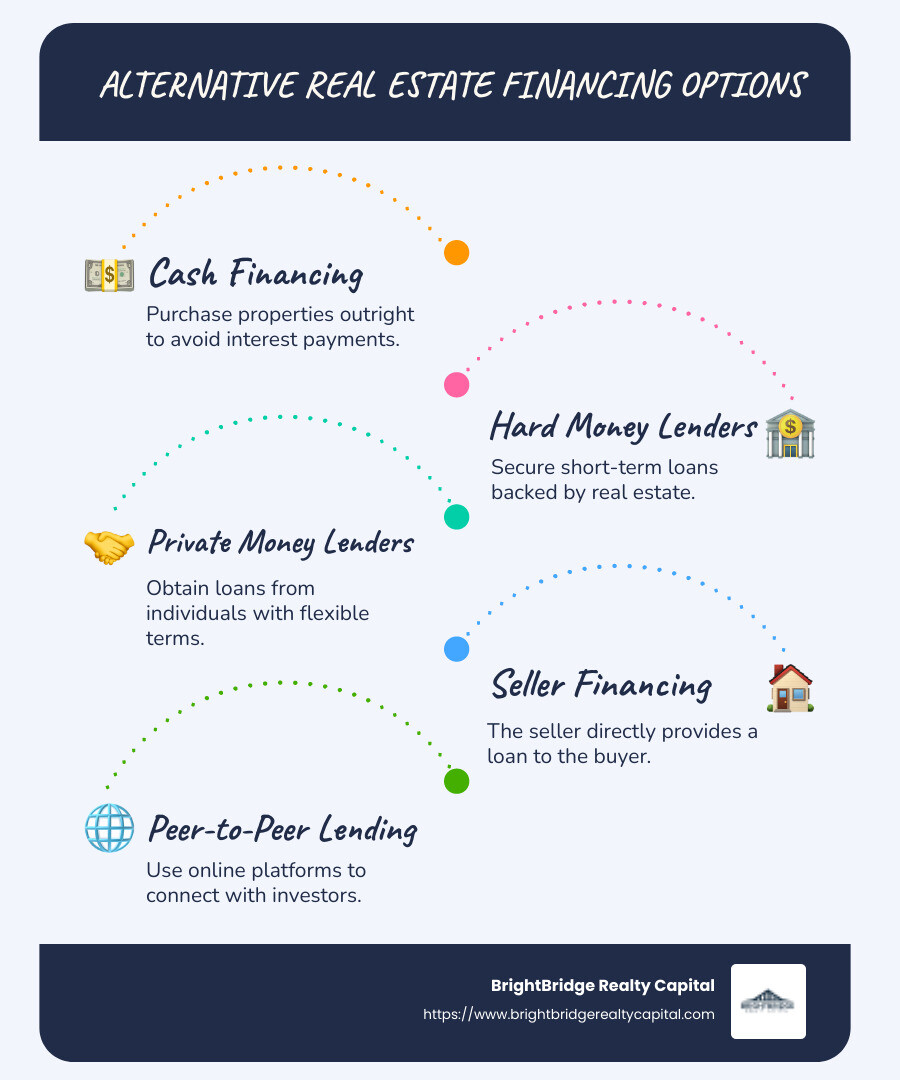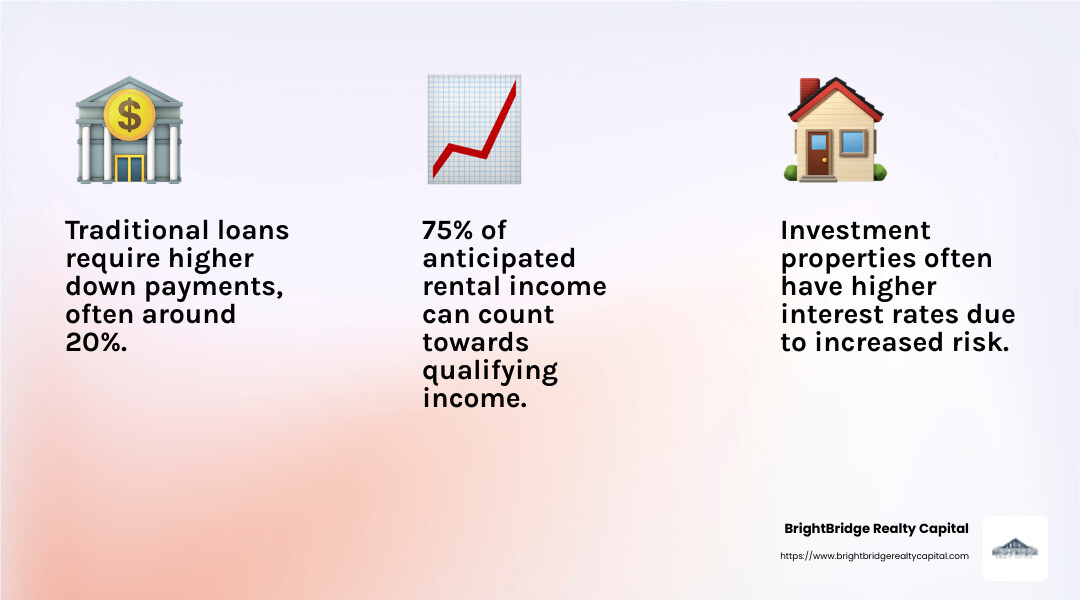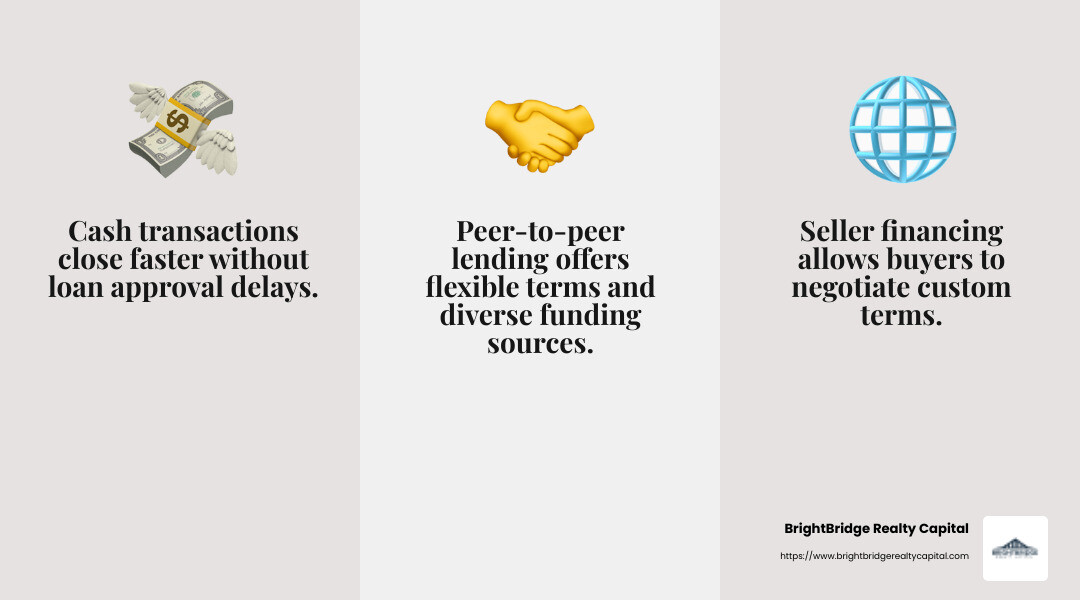Diversify Your Dollars: Alternative Real Estate Financing

For real estate investors seeking quick, flexible, and innovative other financing options for real estate investors, the landscape offers a variety of paths beyond traditional bank loans. Many investors are now considering alternative methods to finance their investment properties, especially when aiming to diversify their portfolios and increase returns.
Here are a few alternative real estate financing options:
- Cash Financing - Buying properties outright to avoid interest payments.
- Hard Money Lenders - Short-term loans secured by real estate.
- Private Money Lenders - Loans from individuals, often with more flexible terms.
- Self-Directed IRA Accounts - Using retirement funds to invest in real estate.
- Seller Financing - The property seller gives a loan to the buyer directly.
- Peer-to-Peer Lending - Funding through online platforms connecting borrowers with investors.
- Lease to Buy - Leasing with an option to purchase later.
Modern investors can capitalize on these innovative solutions to speed up closings and potentially dodge the hefty costs seen with conventional methods.

Terms related to other financing options for real estate investors:
- creative financing for real estate investors
- gap financing for real estate investors
- private financing for real estate investors
Understanding Real Estate Financing
When diving into real estate investing, understanding the various financing options available is crucial. Traditional loans are the most common route for many investors, but they're not the only path to acquiring an investment property.
Traditional Loans
Traditional loans, often referred to as conventional mortgages, are the backbone of real estate financing. These loans are typically provided by banks and other financial institutions. They follow strict guidelines set by entities like Fannie Mae and Freddie Mac.
Key Features of Traditional Loans:
- Higher Down Payments: Usually require a substantial down payment, often around 20% of the property's value.
- Credit Score Requirements: Lenders look for higher credit scores compared to loans for primary residences.
- Fixed or Adjustable Rates: Interest rates can be fixed for the life of the loan or adjustable, changing with market conditions.
Investment Property
An investment property is real estate purchased with the intention of earning a return, either through rental income, future resale, or both. Financing these properties can be more challenging due to the perceived higher risk by lenders.
Considerations for Investment Property Loans:
- Rental Income: Lenders often allow 75% of anticipated rental income to be counted towards qualifying income. This can be a huge advantage for investors.
- Higher Interest Rates: Expect slightly higher interest rates compared to primary residence loans due to the increased risk.
- Larger Down Payments: Typically, a larger down payment is required, often exceeding 20%.
Financing Options
Beyond traditional loans, there are numerous financing options available to investors. These options can be custom to fit different investment strategies and financial situations.
Examples of Financing Options:
- FHA Loans: Backed by the Federal Housing Administration, these are ideal for those with lower credit scores or limited down payment funds.
- VA Loans: Available to military veterans and their spouses, offering benefits like no down payment and no private mortgage insurance.
- Portfolio Loans: Kept within a lender's portfolio, offering flexible terms and conditions.

Exploring these options allows investors to tailor their financing strategy to their specific needs, whether it's a quick flip, long-term rental, or a mix of both. As the real estate market evolves, having a comprehensive understanding of these financing avenues can be a game-changer for investors looking to maximize their returns and diversify their portfolios.
Other Financing Options for Real Estate Investors
When traditional loans don't fit the bill, other financing options for real estate investors can open doors to new opportunities. Let's explore three popular alternatives: cash financing, peer-to-peer lending, and seller financing.
Cash Financing
Cash is king in real estate. Cash financing involves purchasing properties outright without a loan. This method can be advantageous for several reasons:
- Speed: Transactions can close faster since they bypass the lengthy loan approval process.
- Negotiating Power: Sellers often prefer cash offers, which can lead to better terms or lower prices.
- No Interest: Avoiding interest payments can lead to significant savings over time.
However, cash financing requires having substantial funds available upfront, which isn't feasible for everyone.
Peer-to-Peer Lending
Peer-to-peer lending connects borrowers directly with individual investors through online platforms. This method offers several benefits:
- Flexibility: Terms can be more flexible compared to traditional loans.
- Accessibility: Easier access for those who might not qualify for conventional financing.
- Diverse Funding: Investors can pool small amounts of money to fund larger projects.
Platforms like Feather The Nest have made peer-to-peer lending increasingly popular. However, be cautious of higher interest rates and the need for a compelling pitch to attract investors.
Seller Financing
In seller financing, the property seller acts as the lender. The buyer makes installment payments directly to the seller. Here's why it might work for you:
- No Bank Involvement: Simplifies the process and can be faster.
- Customizable Terms: Buyers and sellers can negotiate terms that work for both parties.
- Less Stringent Requirements: Easier for those with less-than-perfect credit to secure a deal.
A noteworthy point: seller financing is ideal when the seller owns the property outright and is open to long-term cash flow over an immediate payout.

Each of these other financing options for real estate investors presents unique opportunities and challenges. By understanding these alternatives, investors can tailor their strategies to fit their needs and financial situations, paving the way for successful real estate ventures.
Next, we'll dig into Creative Financing Strategies and how they can further expand your real estate investment toolkit.
Creative Financing Strategies
When traditional financing methods aren't enough, creative financing strategies can help investors gain access to real estate opportunities that might otherwise be out of reach. Let's explore three popular strategies: syndication, crowdfunding, and lease to buy.
Syndication
Syndication involves pooling resources from multiple investors to purchase real estate. This strategy is perfect for those looking to invest in larger properties without shouldering the entire financial burden alone.
- Leverage Other People's Money (OPM): By partnering with others, you can acquire properties that might be too expensive to buy on your own.
- Shared Expertise: Working with experienced investors or sponsors can improve the success of the investment.
- Diverse Investments: Syndication allows you to diversify your portfolio by participating in multiple real estate projects.
However, syndication can be complex, requiring legal agreements and regulatory compliance. It's best suited for investors with some experience and a willingness to collaborate.
Crowdfunding
With crowdfunding, investors can join forces through online platforms to fund real estate projects. This method democratizes real estate investing, making it accessible to those with smaller amounts of capital.
- Low Entry Barrier: Start investing with minimal capital, often as low as a few hundred dollars.
- Portfolio Diversification: Spread risk by investing in multiple projects across different locations.
- Passive Investment: Sit back and let the platform handle the day-to-day management of the properties.
Crowdfunding platforms handle the heavy lifting, but investors should be aware of potential fees and the need to research each project thoroughly before committing funds.
Lease to Buy
Lease to buy, also known as rent-to-own, allows potential buyers to lease a property with the option to purchase it later. This strategy is beneficial for those who need time to secure financing or improve their credit score.
- Test Before Buying: Live in the property before committing to a purchase, ensuring it meets your needs.
- Build Equity: A portion of the rent may go toward the purchase price, building equity over time.
- Flexible Terms: Negotiate terms that fit your financial situation and timeline.
While lease to buy offers flexibility, it's crucial to understand the terms of the agreement and ensure both parties are clear on their rights and responsibilities.
These creative financing strategies can open up new opportunities for real estate investors. By exploring syndication, crowdfunding, and lease to buy, you can expand your investment toolkit and pursue deals that align with your goals.
Next, we'll explore how you can leverage existing assets to further improve your real estate investment potential.
Leveraging Existing Assets
Leveraging existing assets can be a powerful way for real estate investors to open up capital and expand their portfolios. Let's explore three popular methods: home equity loans, HELOCs, and self-directed IRAs.
Home Equity Loans
A home equity loan allows you to borrow against the equity you've built up in your home. This option is ideal for investors who need a lump sum of cash to finance a property purchase or renovation.
- Fixed Interest Rates: Home equity loans typically come with fixed interest rates, providing predictable monthly payments.
- Lump Sum Payment: Receive a one-time payment that you can use for various investment needs.
- Repayment Terms: These loans usually have terms ranging from 5 to 30 years, allowing for flexible repayment options.
However, using your home as collateral increases the risk of foreclosure if you can't make the payments.
HELOCs
A Home Equity Line of Credit (HELOC) functions like a credit card, allowing you to draw funds as needed up to a certain limit. This flexibility makes it a favorite among real estate investors.
- Variable Interest Rates: HELOCs often have variable rates, which might fluctuate over time.
- Flexible Access: Borrow only what you need, when you need it, making it perfect for ongoing renovation projects.
- Interest-Only Payments: During the draw period, you may only need to pay interest, easing cash flow management.
Though, that the interest rates can change, affecting your monthly payments. Also, like home equity loans, HELOCs use your home as collateral.
Self-Directed IRAs
A self-directed IRA offers a unique way to invest in real estate using retirement funds. With this method, you can diversify your retirement portfolio beyond stocks and bonds.
- Tax Advantages: Enjoy tax-deferred or tax-free growth, depending on the type of IRA.
- Investment Control: Choose from a wide range of investment options, including real estate, while maintaining control.
- Long-Term Growth: Use pre-tax dollars to grow your investment over time.
It's crucial to follow IRS rules closely to avoid penalties. All investment proceeds must return to the IRA, not your personal accounts.
By leveraging existing assets like home equity loans, HELOCs, and self-directed IRAs, you can access the capital needed to seize real estate opportunities. These options offer flexibility, but weigh the risks and benefits carefully.
Next, we'll address frequently asked questions about other financing options for real estate investors, helping you steer the complexities of alternative financing methods.
Frequently Asked Questions about Other Financing Options for Real Estate Investors
What is real estate financing?
Real estate financing is the process of securing funds to purchase property. It involves various funding sources, from traditional bank loans to more creative methods. Investors use financing to buy, renovate, and manage properties. This allows them to grow their portfolios without needing to have all the cash upfront.
How can I secure financing without a large down payment?
If you don't have a large down payment, don't worry. There are several options available:
FHA Loans: These loans are backed by the Federal Housing Administration and require lower down payments, sometimes as low as 3.5%. They're great for first-time buyers or those with less-than-perfect credit.
VA Loans: Available to veterans and their families, VA loans often require no down payment and offer competitive interest rates. They're backed by the Department of Veterans Affairs.
Creative Financing: Methods like seller financing allow buyers to make payments directly to the seller. This can be a flexible option if traditional loans aren't available. Lease-to-buy agreements are another way to start with a smaller initial payment.
Exploring these options can help you secure financing without needing a large sum upfront.
What are the risks of alternative financing?
While alternative financing can open doors, understand the risks involved:
Interest Rates: Some creative financing options come with higher interest rates than traditional loans. This can increase overall costs.
Creditworthiness: Your credit score still plays a role. Poor credit can limit your options or result in higher rates.
Foreclosure: Just like with traditional loans, failure to meet payment obligations can lead to foreclosure. This risk is especially significant when using your home as collateral, as seen with home equity loans and HELOCs.
Understanding these risks helps you make informed decisions and choose the best financing option for your investment strategy.
Next, we'll dive into creative financing strategies, including syndication, crowdfunding, and lease-to-buy, to further expand your real estate investment toolkit.
Conclusion
In the world of real estate investing, securing the right financing options can make all the difference. At BrightBridge Realty Capital, we understand the unique needs of investors and offer flexible funding solutions custom to your goals.
Our approach is centered on fast closings, often within a week, allowing you to seize opportunities as they arise. Whether you're flipping properties, building from the ground up, or expanding your rental portfolio, our direct lending process cuts out the middleman, providing you with competitive rates and a seamless experience.
We know that every investor's journey is different. That's why our team is dedicated to offering customized loan options that fit your specific strategy. From cash financing to creative methods like seller financing and peer-to-peer lending, we ensure you have access to the capital you need, when you need it.
Explore how BrightBridge Realty Capital can support your real estate investment journey by visiting our service page. Let us help you diversify your dollars and grow your portfolio with confidence.


